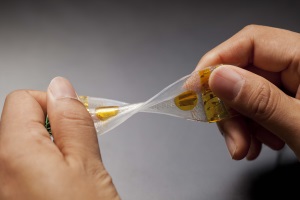MC10, a developer of wearable biometric sensors, formed a broad partnership with the University of Rochester in the state of New York to test new ways that the company’s sensor technologies and data can be used by clinicians.
The agreement creates an umbrella architecture for university researchers and the company to work together. The two organizations have already done some work testing out sensors in cardiology, neurological disorders and orthopedics at the University of Rochester and have also piloted the technology with hospitals in the greater Boston area, said Nirav Sheth, MC10’s director of medical market development.
The devices can be used in the hospital, in rehabilitation centers and later to manage chronic conditions or diseases at home; they are currently being used in clinics. “Everything is potentially on the table given our sensor capabilities,” he said.
Wearable sensors “can enable objective, sensitive, frequent assessments of an individual’s condition to improve their health and advance new treatments for neurological conditions,” Dr. Ray Dorsey, co-director of the Center for Human Experimental Therapeutics at the University of Rochester Medical Center, said in a statement.
MC10 last year announced its first collaboration with a pharma company, partnering with UCB. The organizations are evaluating the MC10 sensor platform, which includes biometric sensing devices and related software and cloud storage, with people who are living with severe neurological disorders and who are taking UCB therapies.
The company also plans to open an office in Rochester, NY.
A number of pharma companies have partnered with developers of wearable technology to better understand how biometric data such as heart rate and steps walked per day contribute to improving the overall health of people with chronic conditions. Biogen recently released the results of a study looking at how patients with multiple sclerosis used a FitBit to track walking activity, which is correlated with disease progression.







